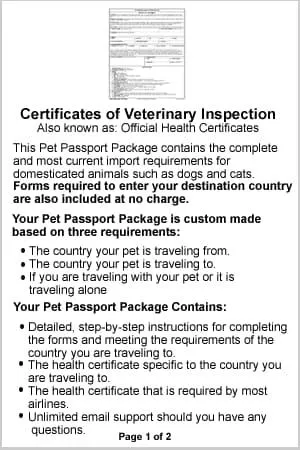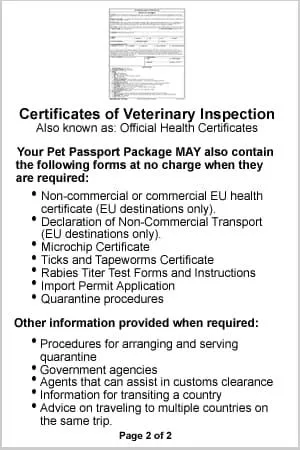Everything You Need to Know About Dog Passports and International Travel
Whether you’re hoping to take your furry friend on vacation abroad or relocate to another country, understanding the process of obtaining a dog passport is essential. In this comprehensive guide, I’ll reveal all the details about cost, requirements, and paperwork involved in getting an EU pet passport for dogs. By the end, you’ll have all the info needed to travel internationally with your canine companion.
What Exactly is a Dog Passport?
Simply put, a dog passport is an official EU document that allows you to travel within the European Union and facilitate borders with your dog. It serves as proof that your pup has met all health, vaccination, and identification standards to freely enter and exit EU/EEA countries. Without an passport, you’d face quarantine protocols or be denied entry when crossing borders with your dog.
The main purposes of a dog passport are to:
- Confirm your dog’s identity with a microchip or tattoo ID
- Verify that all required vaccinations are up to date
- Guarantee your dog is fit to travel and free from contagious diseases
It essentially serves as an internationally-recognized “pet resume” whenever you relocate or vacation within Europe with your canine companion.
How Much Does a Dog Passport Cost in the UK?
Obtaining an official dog passport in the UK typically ranges from £60-100. The breakdown of costs is:
- Microchipping – Around £10-30 depending on vet. This is a one-time cost to implant a microchip for permanent ID.
- First vaccinations – Rabies (around £30-50) plus other core vaccines such as distemper/parvovirus (around £30-50 total). These are required initially.
- Passport book – £25 from your vet to issue the official travel documents.
- Follow-up vaccines – Rabies booster every 3 years (£30-50). Distemper/parvo boosters annually (£30-50 per year).
So in summary, plan for a minimum £60-80 initial setup but expect ongoing annual costs of £60-100 total to keep the passport valid each year with boosters. It’s a multi-year commitment but worth it for hassle-free European pet travel.
How Far in Advance Should I Obtain a Dog Passport?
Most vets recommend obtaining your dog’s passport at least 1-2 months before any international trips. Here are a few key reasons why advanced planning is important:

- It can take 2-4 weeks after initial vaccinations for full immunity to kick in. This must occur before passport is issued.
- You need to schedule an appointment with your vet well in advance for the examinations, paperwork processing, and issuing of official documents.
- If any health issues are discovered during exams, there may be a waiting period before the vet signs off that your dog is fit to travel.
Proper scheduling allows you to avoid last-minute hassles or trips getting cancelled due to an invalid/incomplete passport. It’s best to treat obtaining a dog passport like applying for your own travel documents – start early!
Additional Requirements for Specific Countries
While the core EU pet passport covers travel within much of Europe, some nations have extra rules to know about:
United Kingdom
Dogs must also have been treated for tapeworm recently if arriving from certain high-risk countries like Finland, Norway or Iceland.
Ireland
Dogs need an additional tapeworm treatment 1-5 days before arrival from the UK. Rabies vaccination must be given at least 30 days prior to entry as well.
Malta
A pre-travel blood test 1-3 months before arrival is required to check for diseases like leishmaniosis and ehrlichiosis that are endemic to Malta.
Be sure to research any special rules for your exact travel destinations to avoid last-minute requirements or denied entry at ports.
What if My Dog’s Passport Expiration Date Passes While Traveling?
If your dog’s passport is still valid when traveling but vaccinations expire during the trip, vets in most countries can issue a 30-day temporary vaccination certificate for around £10-20. This allows you to complete your journey before arranging boosters at home.

However, be aware that not every country recognizes temporary certificates. You may need to cut the trip short or face quarantine if vaccines lapse in stricter nations like Norway or Finland. It’s always safer to renew well before expiration date if taking long European vacations.
My Experience Obtaining a Dog Passport
A few years ago when relocating to Spain with my Labrador, obtaining her EU pet passport was quite a process. After bringing her to the vet for registration and initial vaccines, we had to return twice more – once for a rabies booster and final checkup, then again to pick up the official stamped documents.
The multiple visits were tedious but necessary to meet all the health and waiting period requirements. Thankfully, following the vet’s timeline prevented any hiccups at the Spanish border. Now we enjoy carefree jaunts to France and Portugal each summer with no quarantine worries.
Frequently Asked Questions
Q: Can I fly with my dog internationally without a passport?
A: While some non-EU countries like the US allow pet imports without a passport, flying within Europe is not possible without the proper travel documents. You’ll be denied boarding or face quarantine on arrival at airports and ferry terminals.
Q: How long is a dog passport valid for?
A: A dog passport remains valid so long as the rabies vaccination stays up to date. This means renewing the jab every 3 years via a booster shot. Other core vaccines like distemper need boosters annually for ongoing validity.

Q: What if my dog is still a puppy? When can they get a passport?
A: Puppies must wait until 12 weeks old to receive most vaccinations. Then the full course and waiting periods still apply before a passport can be issued – usually around 16-20 weeks of age at the earliest.
In conclusion, obtaining an EU pet passport for traveling internationally with your dog is an investment of both time and money. But following the vet’s guidance and planning well ahead means you can enjoy hassle-free pet vacations across Europe for years to come. Let me know if any other questions come up!
Factors that Influence the Cost of a Dog Passport
| Category | Typical Cost Range |
|---|---|
| Pet Microchipping | £10-£30 |
| Veterinary checks and certificates | £60-£100 |
| Rabies vaccination | £30-£50 |
| Valid rabies antibodies blood test | £40-£60 |
| Pet passport book | £30-£50 |
| Any additional vet fees | Variable |
| Total expected cost for a dog passport | £150-£300 |
FAQ
-
How much does a basic dog passport cost?
A basic EU pet passport will cost you around £60. This allows your dog to travel within the EU and includes their microchip number and vaccinations on the passport. However, extra costs like visiting the vet for checks and vaccinations must be added on top of the passport price.
-
Is there a difference between cat and dog passports?
While cat and dog passports serve the same basic function of allowing pet travel, there are some key differences. Dog passports last 3 years before needing renewal while cat passports only last 1 year. Cats also have some additional vaccination requirements compared to dogs. So in summary – dogs have a longer valid passport but cats need more frequent vet visits and vaccinations which impacts the overall cost.
-
What additional costs are involved with a pet passport?
Besides the basic passport price, you can expect additional expenses like vet checks before travel. Rabies titre tests run around £60-£100 and must be done less than 3 months before entering another country. You’ll also need to pay for any booster vaccinations if yours have expired. Microchipping, if needed, is around £30-£50. So the grand total cost of getting set up for travel can add up to over £150 once vet fees are tacked on.
-
How often does a pet passport need renewing?
Dog passports last 3 years before they expire and need renewal. At that point, your pet must be revaccinated, microchipped if needed, and have a vet check to get a new passport issued. Cat passports are only valid for 1 year, so they require more frequent renewals. Make sure to calendar when your pet’s passport expires so you have enough time to renew it before planning any international trips. Proper renewal is important to avoid issues at borders.

-
Is getting a pet passport worth the cost?
For many pet owners, the cost of a passport and travel preparations is well worth it to enjoy holidays abroad with their furry companions. Being able to bring pets makes it way more feasible to travel to homes with pets or rent pet-friendly vacation properties. Of course, you have to decide if the price is justified for your situation. But if traveling with pets is a priority, the passport is basically a necessity despite the steep costs involved.
-
What happens if my pet’s passport expires during travel?
If your pet’s passport expires during an international trip, it can cause major problems getting back home. Borders will deny entry to pets without valid paperwork. The safest thing is to plan well in advance and renew passports before they reach their expiration date. However, if you’re abroad and it expires, you may have to quarantine your pet for 6 months before being allowed back in their home country. This involves huge kennel fees and missed time together. Plan ahead to avoid such costly blunders!
